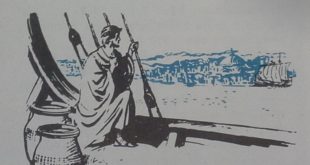Christianity was the movement that spread Across the Roman Empire Pointing the way for the rest of the ancient world toward belief in a single God. The year is 400 A.D. Andropolos paces impatiently up and down the deck of the merchant ship. He is eager to get back home; and to Andropolos, home is the city of Constantinople, a new capital of the Roman Empire. He can already see the walls and buildings of the great city shimmering in the distance. Now the ship is nearing the narrow Bosporus, the waterway where Europe and Asia are hardly a mile …
Read More »Tag Archives: Byzantine Empire
The Crusades 1096-1260
ON A COLD NOVEMBER DAY IN 1096, a great crowd of people gathered in a field at the town of Clermont in France. They had come from miles around and near them were pitched the tents they had put up for shelter. For some days, Pope Urban II had been holding a great council of cardinals, bishops and princes. Today he was to speak to the people and so many wanted to hear that no building was large enough to hold them all. A platform had been built in the center of the field and as Pope Urban stepped up …
Read More »Fury from the North 814-1042
“. . FROM THE FURY OF THE NORTHMEN, Good Lord, deliver us.” Until recent times, this line was included in the prayer book used by the Church of England. The raids of the Norse Vikings on Britain were so terrible that the victims never forgot them. For generations the memory of the savage Norsemen was kept alive and Englishmen repeated this prayer for more than a thousand years. It was not only Britain that felt the fury of the Norsemen; they raided the European continent as well. The Norsemen’s ships themselves seemed to threaten terror. The hull of a Viking …
Read More »The Ottomans, the Last Great Islamic Power A.D. 1299-1922
ACCORDING to their tradition, the Ottoman Turks once belonged to the same Central Asian tribe as the Seljuk Turks. Their ancestors came to Asia Minor with the Seljuks. In time, they began to challenge the authority of their fellow Turks. The Ottomans took their name from a chieftain called Othman, who in 1299 became the emir of Seljuk lands bordering on the Byzantine Empire. Othman declared holy war on his Christian neighbours. His son Orkhan captured the city of Brusa and in 1362 Orkhan’s son Murad took Adrianople, beyond the strait and sea that separated Asia Minor from Europe. Thereafter, …
Read More »The Holy Book of Allah A. D. 632-732
Mohammed sometimes dictated his thoughts to his secretary, Zayd, but when he spoke in public no one wrote down what he said. Instead, his listeners learned his speeches by heart and mistakes crept in, as they usually do. Only a short time after Mohammed’s death people were repeating his sayings in quite different ways. If Mohammed had been anyone else, this would not really have mattered. It would have been enough to remember what he had said without bothering too much about how he had said it. But the Moslems believed that God himself had addressed them through Mohammed. Every …
Read More »The Church and the Empire A.D. 527-1261
CHRISTIANITY, as the official religion of Byzantium‚ was under the control of the government. The emperor was the head of both church and state and high church officials in the East recognized him as the religious leader of the land. One of them wrote, “Nothing should happen in the Church against the command or will of the Emperor.” The church organization was similar to that of the state. As its head, but under the emperor, was the patriarch of Constantinople, who was appointed by the emperor. The appointment had to be approved by high church officials, but actually they never …
Read More »




